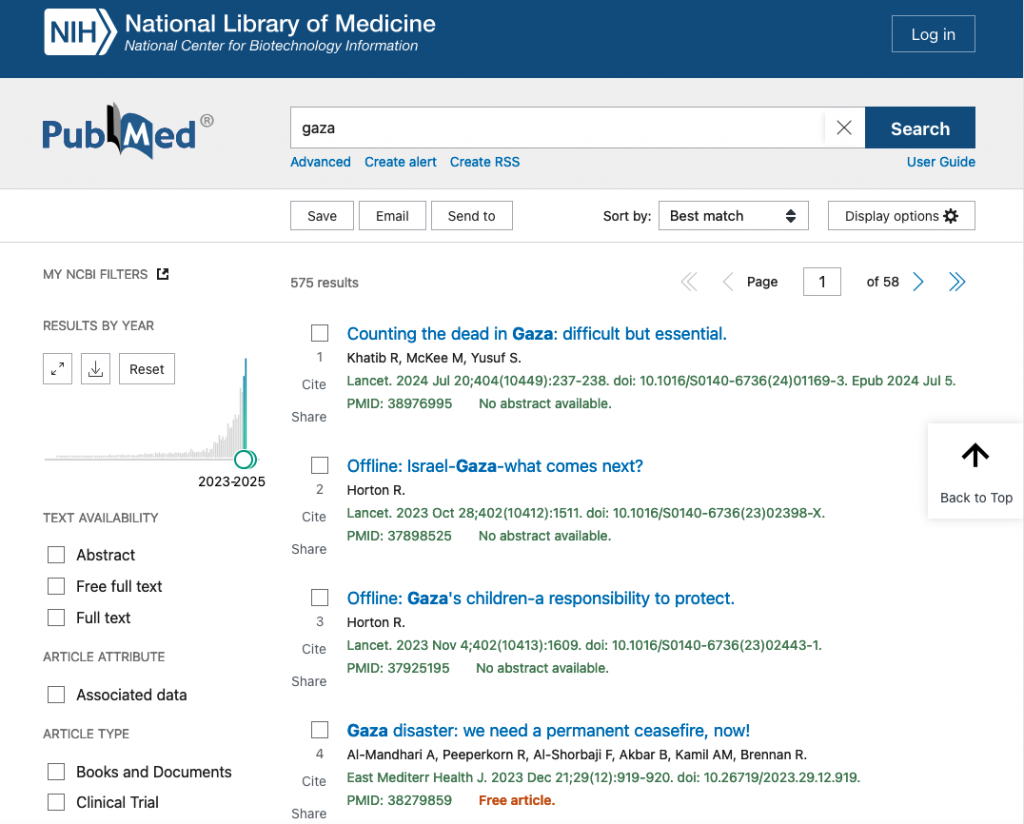Today is World Bioethics Day and the global theme is “non-discrimination and non-stigmatization.” The ongoing genocide in Gaza is an extreme example of discrimination and stigmatization, a health crisis, and a global injustice. We’re using today to add to our previous health and news roundups on the crisis in Gaza and issue an invitation for blog readers to contribute their recommendations for essential bioethics reading on the subject, or to author a post of their own for the blog.
As of mid-October 2024, just over a year since the October 7th attack on Israel by Hamas, according to reporting by Common Dreams, “Israeli forces have killed or maimed more than 150,000 Palestinians in Gaza, including over 10,000 people who are missing and feared dead and buried beneath the rubble of hundreds of thousands of bombed-out buildings, according to Gazan and international officials. Nearly all of Gaza’s 2.3 million people have been forcibly displaced, and at least hundreds of thousands of others have been starved or sickened. Thousands more people have been killed by Israeli forces in the West Bank of Palestine and in Lebanon, where Hezbollah fighters have launched thousands of rockets and other projectiles at Israel, killing and wounding hundreds.”
The serious injuries, starvation, and the spread of communicable diseases resulting from the Israeli military campaign are all compounded by the systematic dismantling of the Palestinian healthcare system, which the UN names among the war crimes and the “crime against humanity of extermination” perpetrated by the Israeli government. International medics have been a source of information on the ground in an environment that has otherwise restricted journalistic and human rights agency presence.
Where’s Bioethics?
Writing after the start of the war in Ukraine and prior to the current conflict in Gaza, Henk ten Have suggests in the Hastings Center Report that: “In bioethics, the issue of war has not been treated as a major concern. The field can do more… Bioethics should focus on strategies to prevent war, encouraging the collective action of health professionals.”
In a scoping review in Bioethical Inquiry, Sualeha Shekhani and Aamir Jafarey sought to identify bioethical contributions related to Gaza since October 7, 2023 through March 30, 2024 in the scholarly and grey literature, focusing on top bioethics journals and related blogs as well as a subset of high impact medical journals. Their review, entitled “Amid Explosions in Gaza, The Silence from the Bioethics Community is Deafening,” found “only fifteen articles have been published in bioethics-related publications included in this scoping review related to the unfolding humanitarian crisis in Gaza.”
Just after this review, two essays ran in the “grey” literature in the Hastings Center Bioethics Forum and Bioethics Today and, more recently, on the Journal of Medical Ethics Blog. But as each of these contributions point out, bioethics engagement remains scant. Notably, a PubMed search for “Gaza” from 2023-present shows over 500 relevant publications (see below), though “Gaza” and “Bioethics” yields only 7 results.

What Should Bioethics Do?
Calls for more bioethics engagement with genocide, war, and the crisis in Gaza specifically often also recognize potential constraints on engagement related to relevant expertise, knowledge, and power. Feminist theory offers important contributions for considering the very concepts of knowledge and power: who is recognized as a knower, what knowledge and perspectives are understood as essential, and which are noticed to be missing.
The idea of standpoint and the positionality of scholars are topics in feminist theory and research ethics applicable to discussions of academic production, knowledge, and power. In a BMJ Global Health essay on “health justice in Palestine,” one author discloses as a “competing interest” that they are “Palestinian, lives in Palestine and has friends and family across Palestine including Gaza. He, therefore, has an interest in his people not being subjected to genocide.” Feminist approaches can help evaluate whether this authorial position is a potential “competing interest” as disclosed, or a source of expertise. It can also unpack broader questions of how power and oppression shape the positions that are normalized or seen as neutral and those that are marginalized or seen as subjective.
Specifically focusing on bioethics, exploring how knowledge and power impact health, medicine, and ethics is a matter for feminist approaches to bioethics. So too are questions of which health and humanitarian crises receive media and bioethical attention and which do not. The World Bioethics Day theme of “non-discrimination and non-stigmatization” also calls attention to how discrimination and stigma impact which crises garner international attention, and which remain under reported conflicts.
Further Reading
Why Palestine Liberation is Disability Justice, Alice Wong, December 2, 2023
We won’t have true reproductive justice until Palestine is free by Rimsha Sayed, Truthout (December 23, 2023)
Hostilities in the Occupied Palestinian Territory – Public Health Situation Analysis (WHO) May 2024
One year of war without rules leaves Gaza shattered by Doctors Without Borders, October 2nd, 2024
Haymarket Books is also offering free e-books on Palestine, see here
For an account of health, disability, and debility in Palestine prior to the present military assault, see The Right To Maim by Jasbir Puar, 2017
The Palestine Program for Health and Human Rights at Harvard holds virtual events, highlights scholarship, and provides educational resources on health justice in Palestine

